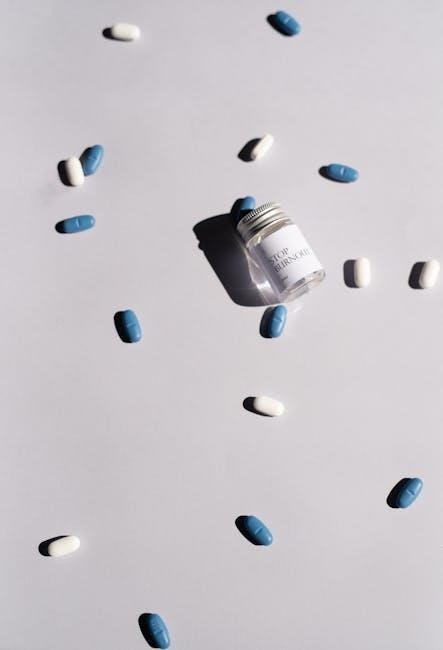
Myasthenia gravis (MG) is a chronic autoimmune disorder affecting neuromuscular transmission, causing muscle weakness and fatigue. Drug sensitivity in MG can exacerbate symptoms or trigger crises. Certain medications, such as antibiotics, heart drugs, and neuromuscular blockers, are known to worsen MG. Telithromycin, a ketolide antibiotic, is particularly dangerous and must be avoided due to its potential to cause severe reactions. Identifying and avoiding these drugs is critical for managing the condition effectively and preventing complications.
Antibiotics to Avoid in Myasthenia Gravis
Certain antibiotics, such as aminoglycosides (e.g., gentamicin, tobramycin) and fluoroquinolones (e.g., ciprofloxacin), can worsen MG by impairing neuromuscular transmission. Use with caution and consider alternatives when possible.
Aminoglycosides (e.g., Tobramycin, Gentamycin, Netilmicin, Neomycin, Streptomycin, Kanamycin)
Aminoglycosides are a class of antibiotics that can worsen myasthenia gravis by interfering with neuromuscular transmission. Drugs like tobramycin, gentamicin, and streptomycin should be avoided as they can exacerbate muscle weakness and fatigue. These medications are known to impair acetylcholine release at the neuromuscular junction, leading to worsening symptoms. Prolonged use or high doses increase the risk of myasthenic crisis. If no alternative treatment is available, close monitoring for signs of neuromuscular blockade, such as drooping eyelids or slurred speech, is essential. Patients should consult their healthcare provider before using these antibiotics to discuss potential risks and alternatives.
Fluoroquinolones (e.g., Ciprofloxacin, Norfloxacin, Ofloxacin)
Fluoroquinolones, such as ciprofloxacin, norfloxacin, and ofloxacin, are broad-spectrum antibiotics that can worsen myasthenia gravis symptoms. These drugs may exacerbate muscle weakness and fatigue by interfering with neuromuscular transmission. They can reduce acetylcholine release at the neuromuscular junction, leading to increased sensitivity and potential myasthenic crises. Patients with MG should avoid fluoroquinolones unless no alternative treatment is available. If use is necessary, close monitoring for signs of worsening weakness is recommended. Fluoroquinolones are particularly risky due to their potential to chelate divalent cations, further impairing neurotransmitter function. Always consult a healthcare provider to explore safer antibiotic options for managing infections in MG patients.
Colistin/Polymyxin B (Colistin, Colistimethate Sodium, Polymyxin B)
Colistin and polymyxin B are antibiotics that can impair neuromuscular transmission, worsening myasthenia gravis symptoms. These drugs may cause muscle weakness, fatigue, and respiratory issues in MG patients. Their use should be avoided unless no alternative treatment is available. If prescribed, close monitoring for neuromuscular deterioration is essential. Colistin and polymyxin B can interfere with acetylcholine release at the neuromuscular junction, exacerbating symptoms. Patients with MG should discuss safer antibiotic options with their healthcare provider to minimize risks. These drugs are particularly risky due to their direct effects on the neuromuscular system, making caution paramount to prevent myasthenic crises.
Heart Medications to Avoid
Heart medications, particularly Quinidine, can worsen muscle weakness in MG patients. Use of such drugs should be avoided unless alternatives are unavailable. Consult healthcare providers for safer options.
Quinidine
Quinidine, an antiarrhythmic medication, can exacerbate muscle weakness and fatigue in MG patients by impairing neuromuscular transmission. It should be avoided unless no alternatives are available. Clinicians must carefully weigh its benefits against potential risks, as it may precipitate myasthenic crises. Patients should be closely monitored for worsening symptoms if Quinidine is deemed necessary. Alternative heart medications with safer profiles for MG patients should be prioritized to minimize complications and maintain optimal neuromuscular function. Always consult a healthcare provider before initiating or adjusting such medications to ensure personalized and secure treatment plans.

Anesthesia Drugs to Avoid
Anesthesia drugs can interfere with neuromuscular transmission, worsening muscle weakness in MG patients. Avoiding these agents is crucial to prevent exacerbation of symptoms and ensure patient safety.
Specific Anesthesia Drugs Implicating Neuromuscular Blockade
Certain anesthesia drugs, particularly neuromuscular blockers, can significantly worsen myasthenia gravis symptoms by impairing neuromuscular transmission. Drugs like succinylcholine and rocuronium should be avoided, as they can exacerbate muscle weakness or trigger a myasthenic crisis. These agents interfere with acetylcholine receptors, further disrupting communication between nerves and muscles. Patients with MG are highly sensitive to these medications, making alternative anesthetic approaches essential. Anesthesiologists must carefully assess the risks and benefits, often opting for non-paralytic agents or closely monitoring neuromuscular function. Avoiding these drugs is critical to preventing severe complications and ensuring safe anesthesia management in MG patients.

Brain and Nerve Drugs to Avoid
Certain brain and nerve medications can worsen myasthenia gravis symptoms. Botulinum toxin and D-penicillamine are particularly risky, as they can trigger or exacerbate muscle weakness and neuromuscular dysfunction. Avoid these drugs unless medically necessary.
Botulinum Toxin
Botulinum toxin, commonly used for treating muscle spasms, dystonia, and cosmetic procedures (e.g., Botox), can worsen myasthenia gravis symptoms. This neurotoxin inhibits acetylcholine release, exacerbating muscle weakness and neuromuscular dysfunction. Patients with MG should avoid botulinum toxin unless medically essential, as it may trigger severe weakness or crisis. Even small doses can heighten sensitivity and worsen symptoms. Alternative treatments should be explored to minimize risks. Clinicians must carefully weigh benefits against potential adverse effects in MG patients.
D-penicillamine
D-penicillamine is a chelating agent used to treat Wilson’s disease and, in some cases, rheumatoid arthritis. However, it is strongly associated with inducing or exacerbating myasthenia gravis symptoms. Studies have shown that D-penicillamine can trigger muscle weakness and neuromuscular dysfunction in susceptible individuals. Patients with MG should avoid this drug unless its use is absolutely necessary and closely monitored by a healthcare provider. The risk of worsening symptoms makes it a critical medication to avoid in most cases; Alternative treatments for Wilson’s disease or rheumatoid arthritis should be considered to minimize the risk of complications in MG patients.

Miscellaneous Drugs to Avoid
Miscellaneous drugs such as magnesium-containing medications, statins, and immune checkpoint inhibitors can worsen myasthenia gravis symptoms. These drugs may exacerbate muscle weakness or trigger neuromuscular issues, necessitating careful avoidance or alternative treatments under medical supervision.
Magnesium-Containing Drugs
Magnesium-containing drugs should be avoided in patients with myasthenia gravis unless absolutely necessary and only when severe magnesium deficiency is confirmed by blood tests. These drugs can impair neuromuscular transmission, worsening muscle weakness and fatigue. Even magnesium-based medications for constipation should be avoided, especially in patients with impaired kidney function, as they may accumulate to toxic levels. The use of intravenous magnesium is also contraindicated unless medically essential. Always consult a healthcare provider before using any magnesium-containing products to ensure safe management of the condition and prevent potential exacerbation of symptoms.
Statins (e.g., Atorvastatin, Pravostatin, Rosuvastatin, Simvastatin)
Statins, such as Atorvastatin, Pravostatin, Rosuvastatin, and Simvastatin, have been reported to potentially worsen myasthenia gravis symptoms in some patients. While generally safe for most people, these drugs may exacerbate muscle weakness in individuals with MG. The International Consensus Guidance for Management of Myasthenia Gravis highlights statins as medications that should be used with caution; Patients with MG should consult their healthcare provider before starting or stopping statins to weigh the benefits of cholesterol management against the risks of symptom exacerbation. Alternative treatments for hyperlipidemia may be considered to avoid potential complications.
Immune Checkpoint Inhibitors
Immune checkpoint inhibitors (ICIs), such as Pembrolizumab and Nivolumab, have been associated with the development or worsening of myasthenia gravis in some patients. These drugs, used primarily in cancer treatment, can trigger autoimmune responses, including neuromuscular symptoms. Patients with pre-existing MG are at higher risk of exacerbation when treated with ICIs. Clinicians should exercise caution and monitor for signs of MG, such as muscle weakness or respiratory difficulty. In cases where ICIs are essential, close supervision by a neurologist is recommended. Alternative treatments may be considered to balance cancer management and MG risks.

Special Considerations in Drug Use
Drugs must be used cautiously, prioritizing alternatives when possible. Monitor magnesium levels before using magnesium-containing drugs. Regularly assess for neuromuscular blockade risks and adjust therapies accordingly.
High-Dose Steroids
High-dose steroids are often used in managing myasthenia gravis but must be approached with caution. While steroids can reduce inflammation and suppress the immune system, excessive doses may worsen neuromuscular symptoms. Patients should be closely monitored for signs of increased muscle weakness or fatigue. Gradual tapering is recommended to minimize risks. Additionally, the benefits of high-dose steroid therapy must be weighed against potential complications, such as increased susceptibility to infections or adrenal insufficiency. Alternative immunosuppressive agents may be considered if high-dose steroids are not tolerated or effective. Regular follow-ups are essential to ensure safe and optimal treatment outcomes.
Neuromuscular Blockers
Neuromuscular blockers are drugs that impair the transmission of nerve impulses to muscles, leading to paralysis. In patients with myasthenia gravis, these drugs can worsen muscle weakness and trigger a myasthenic crisis. Common neuromuscular blockers, such as succinylcholine and pancuronium, should be avoided unless absolutely necessary and only under close medical supervision. Even at low doses, these drugs can exacerbate symptoms due to the underlying neuromuscular dysfunction in MG. Alternative treatments or reduced doses are often recommended to minimize risks. Patients and caregivers should be aware of the potential dangers and discuss safer options with their healthcare providers to avoid complications.
General Guidelines for Patients with Myasthenia Gravis
Patient education is crucial to avoid drug-induced worsening of symptoms. Regular monitoring of drug effects and alternative treatment options should be discussed with healthcare providers. Carry a list of medications to avoid and inform all treating physicians to ensure safe care and prevent complications.
Patient Education on Drug Avoidance
Patient education is critical to managing myasthenia gravis effectively. Patients should be informed about drugs that may worsen symptoms or trigger crises. Creating a detailed list of medications to avoid and sharing it with all healthcare providers ensures safe treatment. Regular discussions with doctors about alternative therapies and potential risks are essential. Patients should also be encouraged to carry a wallet card listing unsafe medications. Education empowers patients to recognize early signs of drug-induced worsening and seek prompt medical advice. Open communication between patients and healthcare providers is key to preventing complications and improving quality of life. Proactive education fosters better adherence to treatment plans.
Regular Monitoring of Drug Effects
Regular monitoring of drug effects is essential for patients with myasthenia gravis (MG) to ensure safe and effective treatment. Patients should schedule frequent follow-ups with their healthcare provider to assess how medications are impacting their condition. This includes monitoring for signs of worsening symptoms, such as increased muscle weakness or respiratory difficulties. Blood tests and neurological exams may be necessary to evaluate drug efficacy and potential side effects. Open communication between patients and doctors is crucial to promptly address any adverse reactions. Adjustments to medication regimens should be made cautiously, with careful observation for any changes in symptom severity or overall health. This proactive approach helps maintain optimal control of MG and minimizes risks associated with drug therapy.
Alternative Treatment Options
For patients with myasthenia gravis (MG), alternative treatment options are crucial when certain drugs must be avoided. Immunosuppressive therapies, such as rituximab and eculizumab, are effective in managing symptoms without worsening the condition. Methotrexate and intravenous immunoglobulin (IVIG) are also commonly used to reduce disease severity. Plasma exchange may be considered in severe cases to remove harmful antibodies. Additionally, symptom management strategies, such as cholinesterase inhibitors, can help improve neuromuscular function. These alternatives should be tailored to the patient’s specific condition and discussed thoroughly with a healthcare provider to ensure safety and efficacy. Exploring these options can significantly improve quality of life for MG patients.